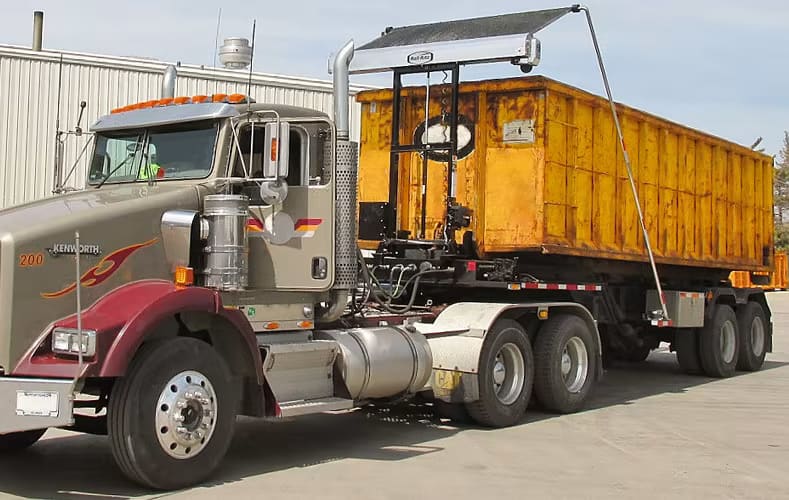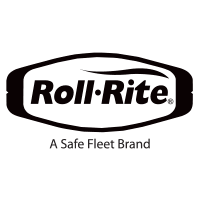
The tarp roller systems used for single axle hook lifts, multi axle roll offs, trailers for larger containers, or even luggers and skip loaders are among the toughest and most durable tarping systems manufactured. They are built to withstand harsh environments yet operate efficiently so you spend less time fumbling at the jobsite.
Selecting a tarp system for your roll-off truck or trailer can be a difficult decision. You need the best load containment, but you also want a safe system with a low cost of ownership. In this article we’ll explore several options available, and the implications of not having a proper tarp roller system.
Semi-auto vs. automatic tarp systems
Semi-automatic pull tarp systems operate by manually pulling the tarp out over the load with a pull rope. The tarp is retracted back into the housing using spring tension within the roller mechanism. While there are numerous scenarios where this type of system works well, heavy-duty refuse and waste haulers usually opt for fully automated systems -- often with advanced wireless controls.
Safety with an automated tarping system
There are numerous risks associated with garbage collection and waste transfer. When tarping a load, drivers often need to leave the cab of the truck. With the help of a remote wireless control, drivers can observe tarp operation from a safe distance. Plus, tarping can be completed in a matter of minutes, ensuring drivers are back in the cab of their truck and away from other nearby hazards.
Improve revenue with an automated tarping system
Vehicle weight is a factor in this industry. If you opt for a lightweight aluminum system, you can legally haul more load which equates to more revenue per load. And when you select a system designed with maintenance in mind, you can also reduce the cost of ownership.
What system is right for your roll off, hook lift or detachable container trailer?
Refuse and recycling haulers need a reliable system with a powerful motor and easy-to-replace parts. These vehicles have numerous tarping options to accommodate different users. You’ll have to evaluate what features are important to your situation.
Drivers in the northeast often select hydraulic systems with heavy-study steel arm construction. In other parts of the country, we see many drivers or fleet managers select a lighter weight aluminum system. If you’re hauling the same size containers again and again, a fixed pivot solution is ideal. If you’re hauling between 10 and 50-yard containers, you’ll want to look at a system with an adjustable pivot for variable loads.
No matter what system you evaluate, look for a strong manufacturer’s warranty and the ability to easily replace parts and components. Remember that working with a trusted manufacturer or dealer helps reduce repair labor and downtime.
Impacts of not having a proper tarp roller system
When your goal is to finish your route or leave the jobsite faster and without incident, it’s imperative that you have a quality tarping solution. Here are some of the issues you may experience without the right solution.
Injuries and lawsuits can be costly
Working around large vehicles creates risks – reversing accidents or simple trips and falls can cause workplace injuries. The load itself might contain dangerous materials as well. By eliminating any level of manual handling, you are ensuring drivers remain safe while on the job. Plus, automated tarp systems may possibly save you money with some insurance carriers.
Load securement violations can lead to downtime
Waste and recycling haulers should be prepared for formal DOT audits and events like the annual Commercial Vehicle Safety Alliance International road check. Inspectors typically look for physical defects and visible violations that warrant a truck to be pulled over for a full roadside inspection.
Remember that a load must remain secured on or within the transporting vehicle so that it does not leak, spill, blow off or become dislodged from the vehicle. You can avoid costly out of service events by installing and using the right tarp roller system for your truck or trailer.
Downtime for repairs translates to lost revenue
These tarping systems operate in harsh environments and maintenance is part of ownership. Owner-operators, fleet companies and municipalities should consider systems that are designed to be low maintenance. Look for original factory replacement parts and components that can be shipped quickly.
Tarp roller systems support safer truck and trailer operations
These are just several aspects to keep in mind when selecting a tarping system for your roll-off truck or trailer. Remember that the right tarping system will protect both the payload and the driver. If your goal is to ensure safe waste, recycling and refuse operations, explore our tarp roller systems for larger containers, luggers, skip loaders and more.

 English
English  Français
Français  Deutsch
Deutsch  Nederlands
Nederlands  Français
Français  English
English  English
English 
